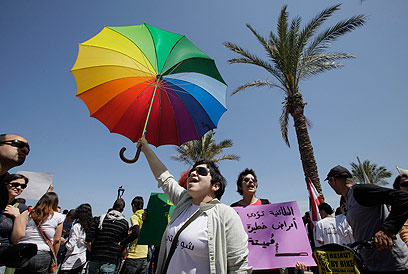
Thousands of Lebanese march against sectarianism
Protesters march against 'mentality that led to civil war' 35 years ago in small country of 18 religious sects
At least 2,000 Lebanese marched through central Beirut on Sunday in a show of support for secularism in their deeply divided country.
The "Laique Pride," or "Secular Pride," march was organized by civil society groups. Participants headed toward parliament in downtown Beirut but were prevented from reaching the compound by Lebanese soldiers.
Lebanon is home to 18 religious sects and is deeply divided along sectarian lines. The country experienced a ruinous 15-year civil war between Muslims and Christians that ended 20 years ago.
Since Lebanon gained independence in 1943, the president has always been a Maronite Christian, the prime minister a Sunni Muslim and parliament speaker a Shiite Muslim. Parliament and Cabinet seats are equally divided between Christians and Muslims.

'The army must not get near parliament.' (Photo: Reuters)
"We are here today to call for annulling the mentality that led to a war 35 years ago," said Marianne Ghattas, a 16-year-old high school student, referring to the 1975-90 civil war that killed 150,000 people.
"In order for us to accept each other and live equally there should be no sectarianism," Ghattas said.
Sectarian rifts are common between Sunni, Shiite and Christian communities. Each community makes up roughly a third of Lebanon's population of 4 million.
Dozens of participants danced and played music as they sang: "No to sectarianism, we are all Lebanese. Yes to secularism."

Annulling mentality that led to civil war. (Photo: Reuters)
But it is not just the country's politics that are sectarian.
Lebanon's personal status laws are based on religion-based issues like marriage and inheritance. Lebanese can only have religious marriages. Those who want to have a civil marriage must do so abroad.
"Civil marriage, not civil war," read a banner carried by Ghattas and several others.
University student Nadim Zeydan, 18, said that what was needed was a law that does not differentiate between people according to their sects. "We should have secular laws and people can live their sect at home," said Zeydan, wearing a T-shirt that reads "What is your sect? ... It's none of your business."
A large banner carried by the participants read: "Together against racism and sectarianism for a secular and democratic nation."










